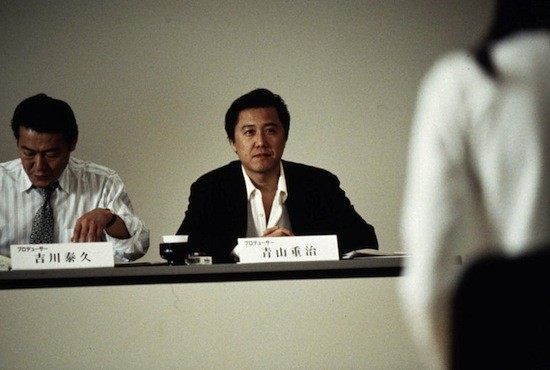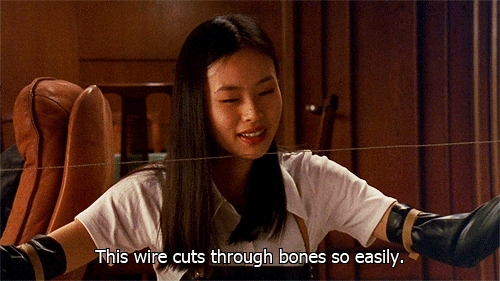
Audition (1999; dir. Takashi Miike)—The first twenty-five minutes of Audition feel nothing like Ringu, The Cure, Pulse or similar J-horror masterpieces; in fact, they are so mundane and quiet that you might start to wonder whether someone has replaced the gory provocation you expected with a sweet and sour Japanese rom-com. What’s all this about a middle-aged widower named Aoyama (Ryo Ishibashi) who, with the help of his film producer buddy Yoshikawa (Jun Kunimura), sets up a series of casting calls for a nonexistent movie in hopes of finding Aoyama a new girlfriend—preferably one who’s “beautiful, classy and obedient”? What’s with the sprightly elevator music playing in the background during these light-comic audition scenes? Is this the same film that sent droves of people from the theater during its premiere at the Rotterdam film festival?
It is. Be patient.
At first, you probably won’t notice the tiny cracks and fissures threatening Audition’s tone, subject matter and structure early on. However, like thunder on the horizon, they portend grave danger if you’re unprepared. Twenty-seven minutes and forty-five seconds into the film, Aoyama takes a break from the auditions, wanders into the waiting room and notices Asami (Eihi Shiina), a young girl dressed in white who’s sitting at a table and reading, her back turned away from the rest of the eager, friendly girls eager for their big break. This is the girl for her, Aoyama thinks. Eight minutes later he’s calling her up and asking her out. She says yes.
Thirty-seven minutes and ten seconds into the film, Yoshikawa tells Aoyama “something isn’t right” about Asami’s background story. At 41:32, Yoshikawa informs Aoyama, “We can’t reach anybody who knows her” and urges his friend to “Cool down a bit.” At 43:22, there’s a sudden cut to Asami in a small apartment that’s empty save for an old stereo system, a giant black rotary phone, a pair of pink ballet slippers, and what looks like a large folded-up tent in a canvas sack. At 47:45, Miike cuts to an extreme close-up of Asami in profile, her lips opening into a smile that suggests a venus flytrap closing around an unsuspecting insect. At 48:10 comes the most bracing cinematic shock since Jaye Davidson dropped trou in The Crying Game.

That’s also when everything, including a reliable and conventional sense of narrative or cinematic time, falls apart. Asami and Aoyama’s dreamlike weekend getaway by the sea is suffused with a miasma of pedophilia and bodily mutilation. As she talks, Asami—tall, bony, distant, slightly asymmetrical—starts to sound less like the perfect woman of Aoyama’s dreams and more like a mythical demon who’s temporarily assumed human form. Barriers separating facts, speculations and dreams gradually crumble. An afternoon-to-evening time-lapse sequence lingers just long enough to remind you what conventional film poetry looks like before it’s trash-compacted into oblivion.
Sixteen years later, Audition’s notorious finale still stands above and apart from its misbegotten torture-porn children like a buoy afloat on a sea of blood and body parts. It’s notable for the way it combines the psychological scars and deviant psychology of the greatest J-horror films with the ultra-violence of Asian action cinema. But what makes it really great—as far as these things go, anyway—is that it doesn’t stop there. It pins moviegoers to the wall, forces you to cover your eyes and ears and won’t stop until it goes deeper, deeper…deeper, deeper…
Grade: A
Horrotober: Audition (1999)